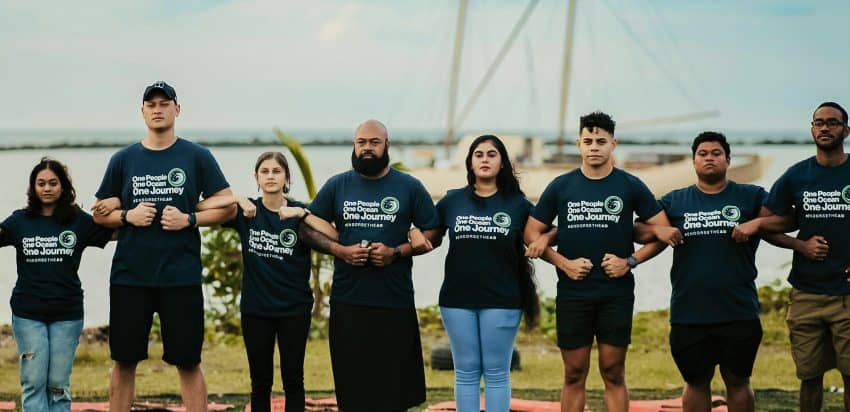The United Nations has adopted a landmark resolution asking the International Court of Justice (ICJ) to deliver an opinion on climate change and the legal consequences countries face for harming the environment.
It is the culmination of a four-year push launched by Vanuatu as part of a global campaign led by Pacific Islands Students Fighting Climate Change, a group involved in getting the resolution to the General Assembly.
As the UN’s judicial arm, the ICJ is often asked to provide answers to legal questions to guide UN organisations and member countries.
These are called advisory opinions and outline what current international law has to say about a given legal question brought to the court through a UN resolution.
While the court’s rulings are not binding, they influence international opinion.
In the past, the ICJ has considered the legality of constructing an Israeli-built separation barrier, and ordered Myanmar to prevent acts of genocide against Rohingya Muslims.
The opinions themselves are not judgements, and the ICJ does not have the power to jail, fine or punish individuals or companies on the basis of them.
But according to Professor Margaret Young, an international law expert at Melbourne Law School, they carry legal weight and moral authority that can influence future decisions.
“Advisory opinions are requests from United Nations organs like the General Assembly for advice on legal questions to guide those organs in how they respond to issues … [and] are not intended to be binding on states.”
The resolution, drafted by 18 countries, has asked the ICJ to rule on:
*What obligations do states, under international law, have to ensure the protection of the climate system and other parts of the environment from anthropogenic emissions of greenhouse gases for States and for present and future generations
*What legal consequences there are under these obligations for states where they, by their acts and omissions, have caused significant harm to the climate system and other parts of the environment, with respect to:
*(a) States, including, in particular, small island developing states, which due to their geographical circumstances and level of development, are injured or specially affected by or are particularly vulnerable to the adverse effects of climate change
*(b) Peoples and individuals of the present and future generations affected by the adverse effects of climate change
The Pacific Islands Forum Chair, Cook Islands Prime Minister Mark Brown, welcomed the adoption, stating the resolution “leaves the world’s most vulnerable nations in no doubt that there is an obligation of stewardship upon all nations to ensure this one Blue Planet will continue to sustain all peoples, today and into the future.”
“Coming in the wake of the IPCC report, we find ourselves faced with an incredible opportunity where both the highest level of the international legal order, and the highest global level of scientific analysis on the climate, are offering a way forward through the looming existential crisis,” he said.
Cynthia Houniuhi of the Solomon Islands and President of Pacific Islands Students Fighting Climate Change, stressed “I don’t want to show a picture to my child one day of my island. I want my child to be able to experience the same environment and the same culture that I grew up in… The environment that sustains us is disintegrating before our eyes.”
Vanuatu, home to about 300,000 people across roughly 80 islands, has been labelled the most at-risk country in the world for natural disasters.
In late February, Vanuatu was hit by two cyclones just days apart, shining a light on its vulnerability to climate change.
Vanuatu’s Climate Change Minister Ralph Regenvanu said the country had always led on issues of climate justice.
“We were a founding member of the association of small island states and the first chairman of that group, which is now one of the main climate lobbies at COP,” he said.
“We were the country to first raise loss and damage in the United Nations Framework Convention on Climate Change in 1981.”
With Vanuatu’s cyclone season ending in May, Regenvanu said the biggest concern was being unable to keep people safe amid flooding, saltwater inundation and sea level rise.
“It’s happening right now, and people are not safe right now,” he said.
He said relocating entire populations from flood-prone areas and building new infrastructure was a “huge challenge” for the cash-strapped developing nation.
“We only graduated from least developed country status less than two years ago,” he said.
“We are a very poor developing country; we don’t have the necessary money we need to build resilient infrastructure like new roads to withstand the impacts of climate change, which require 10 times the investment you need for a normal road.”
“That’s why we’ve been fighting for this issue of loss and damage for a long time because we really desperately need the money, and it’s a problem we didn’t cause.”
Regenvanu hopes an advisory opinion will embolden Pacific people in their fight for climate justice.
“The good thing about an ICJ advisory opinion is that no matter what court you’re arguing — whether it be at the lowest level or the highest level — it applies.”
“It can be used in any court as a persuasive precedent,” Regenvanu said.
